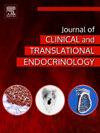分化型甲状腺癌(DTC)患者在正确的时间使用正确的药物并进行正确的检查
IF 3.3
Q1 ENDOCRINOLOGY & METABOLISM
Journal of Clinical and Translational Endocrinology
Pub Date : 2024-12-01
DOI:10.1016/j.jcte.2024.100373
引用次数: 0
摘要
由于关键分子途径的确定,晚期分化甲状腺肿瘤(dtc)的治疗前景在过去十年中有了显着改善。MAPK和PI3K/AKT通路中相互排斥的基因变化的发现,如RET或NTRK融合以及BRAF和RAS基因的致病性突变,极大地影响了治疗方案。事实上,多激酶抑制剂和选择性抑制剂在放射性难治碘(RAI-R)药物治疗中表现出了出色的疗效,总有效率高达86%。因此,对于rar - r dtc,常规分子检测可操作的基因改变现在是必要的,为正确的患者选择正确的治疗方法。此外,肿瘤基因分型还允许识别预后较差的患者亚群,这可能需要量身定制的临床管理。因此,正确的检测还应包括非驱动TERT、TP53、PIK3CA和其他侵袭性突变,目的是基于分子的风险分层。因此,在转移性DTC患者或具有高度侵袭性组织学特征的患者的诊断工作中,应考虑肿瘤基因分型,以便在正确的时间给正确的患者正确的药物。本文章由计算机程序翻译,如有差异,请以英文原文为准。
The right drug for the right patient at the right time with the right test in differentiated thyroid cancer (DTC)
Thanks to the identification of crucial molecular pathways, the therapeutic landscape for advanced differentiated thyroid tumors (DTCs) has significantly improved during the last ten years. The therapeutic scenario has been greatly impacted by the discovery of mutually exclusive gene changes in the MAPK and PI3K/AKT pathways, such as RET or NTRK fusions and pathogenic mutations of the BRAF and RAS genes. Indeed, multi-kinase inhibitors and selective inhibitors have demonstrated outstanding efficacy for radioactive iodine-refractory (RAI-R) drug treatment, with overall response rates reaching up to 86%. Thus, for RAI-R DTCs, routine molecular testing for actionable gene alterations is now essential, for choosing the right therapy for the right patient.
Additionally, tumor genotyping also allows to identify a subset of patients with worse prognosis disease, which may deserve a tailored clinical management. Thus, the right test should also include non-driver TERT, TP53, PIK3CA, and other mutations of aggressiveness, with the aim of a molecular-based risk stratification. Therefore, tumor genotyping should be considered in the diagnostic work-up of metastatic DTC patients or with highly aggressive histological features, in order to give the right drug for the right patient at the right time.
求助全文
通过发布文献求助,成功后即可免费获取论文全文。
去求助
来源期刊

Journal of Clinical and Translational Endocrinology
ENDOCRINOLOGY & METABOLISM-
CiteScore
6.10
自引率
0.00%
发文量
24
审稿时长
16 weeks
 求助内容:
求助内容: 应助结果提醒方式:
应助结果提醒方式:


